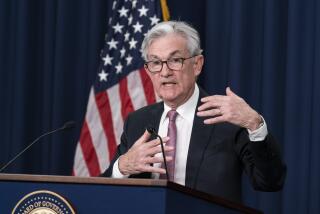Upsurge in Mexico’s GDP Raises Fears That Economy Will Overheat
- Share via
MEXICO CITY — Economic growth is at a three-year high. Inflation is at its lowest since 1994. Unemployment is at a 15-year low, and domestic consumption is finally healthy. So why are Mexican business leaders sounding the alarm?
Indeed, several prominent corporate executives this week expressed concern that, with a presidential election just six weeks away, Mexico may be on the verge of growing too fast and overheating dangerously.
It is a nice problem to have. So far, Mexican economic authorities are proving capable of balancing high growth and low inflation for the first time in an election year since 1970.
The government announced two key numbers in recent days: Economic growth for the first quarter was 7.9%, the highest rate in 11 straight quarters. Yet annual inflation through the end of April dropped to 9.73%.
It was the first time inflation has fallen below double digits since 1994, when the peso crisis erupted and sent Mexico into a profound recession. Inflation during 1995 was as high as 52%.
Cutting inflation below double digits by the end of this year has been a central government economic goal--along with avoiding the economic implosions that have occurred every presidential election year for the last quarter of a century.
Alberto Fernandez Garza, head of the influential Employers’ Confederation of the Mexican Republic, put the concerns plainly, recalling the famed original Volkswagen Beetle, which along with the newly designed version is still made and sold in Mexico and is known affectionately as the Vocho.
“I believe the current growth of 7.9% is totally risky in the sense that it is not sustainable,” Fernandez Garza told reporters. “The metaphor that I use is the Vocho: Maybe the Vocho can sprint at 100 miles an hour, but we need to change some things on the Vocho to be able to sustain that kind of speed safely.”
The surge in gross domestic product prompted the Bank of Mexico, the nation’s central bank, to warn that inflation may indeed be looming. To restrain demand, the government Tuesday further restricted the money supply by raising the amount that commercial banks must deposit in the central bank. That tends to raise interest rates and cool the economy.
“The strong dynamism that aggregate demand has shown could generate higher prices for noncommercial goods, put pressure on salaries and quickly raise the trade deficit, all of which could make it difficult later on to maintain the desired decline in inflation,” the central bank said.
Independent economist Jonathan Heath praised the central bank’s measures, saying it signaled an important maturing of a bank once known for easing the cost of credit during an election year, not raising it.
“The good news is that the Bank of Mexico is acting autonomously from the federal government and independently of the electoral process,” Heath wrote in a column Thursday.
The other healthy aspect, Heath said, is that “little by little, the expansion of exports has generated more jobs and buying power, and finally there is a vigorous recovery of the domestic market.”
Exports have driven the economy’s four straight years of GDP growth while many Mexicans were battling to recover from the 1995 recession. Now, Heath said, “there is a more homogenous expansion in our economy.”
Carlos Elizondo Mayer-Serra, head of the Center for Economic Teaching and Research in Mexico City, said in an interview: “What is surprising is the reaction of the principal business leaders. Instead of euphoria, they are saying the economy should grow less quickly. But the great difference between this and past periods of growth is that we are doing it now with low inflation.”
Raul Feliz, head of macroeconomic studies at the center, said the burst of economic growth is built on several factors unlikely to be repeated.
He said that world prices for crude oil, a major Mexican export, soared during the year, and that the U.S. economy is booming, feeding demand for Mexican goods.
“Oil will not continue rising, and U.S. interest rates are now rising, which will be negative. . . . So by its own nature, the Mexican economy will slow down,” Feliz said.
He projects growth of 5.6% this year, which he calls a cyclical peak, easing to 3.7% in 2001 as the economic cycle matures.
(BEGIN TEXT OF INFOBOX / INFOGRAPHIC)
Will Faster Growth Bring Inflation?
Since 1990, Mexico has enjoyed economic growth every year except 1995, and growth in the first quarter of this year spurted ahead at a robust annual rate of 7.9%. But now economists worry that the rapid growth will undermine the nation’s successful efforts to rein in inflation, which has fallen since 1995.
Sources: International Monetary Fund, Bank of Mexico
More to Read
Sign up for Essential California
The most important California stories and recommendations in your inbox every morning.
You may occasionally receive promotional content from the Los Angeles Times.













